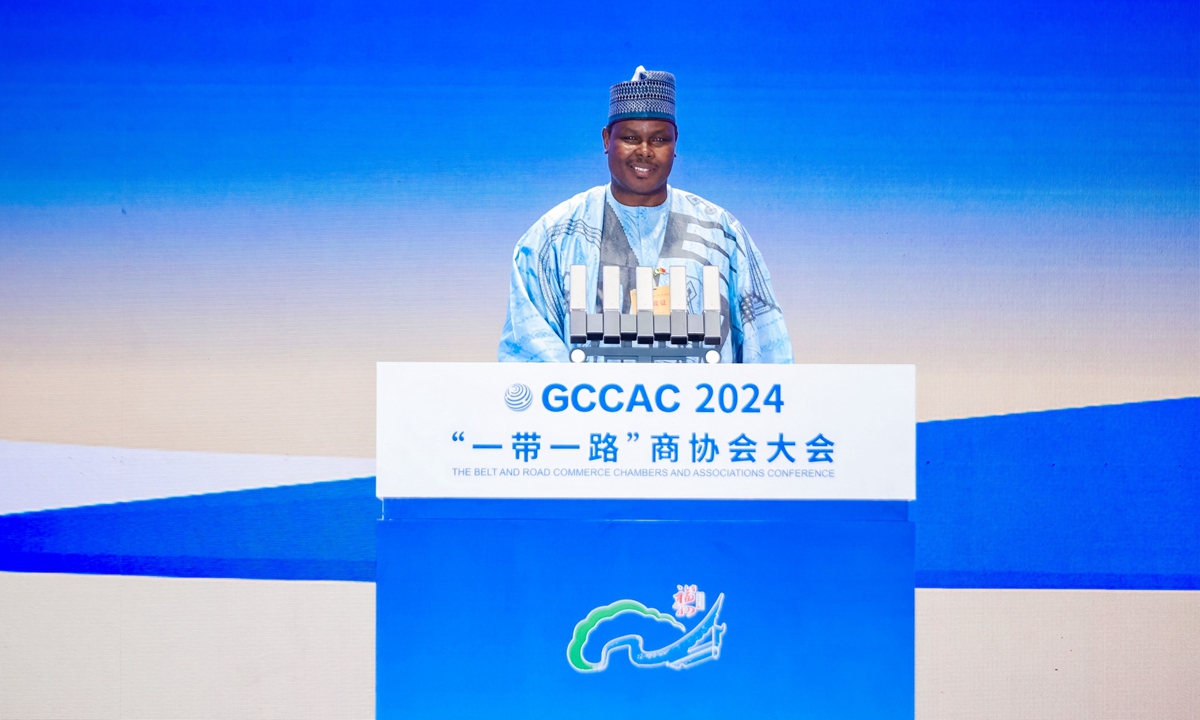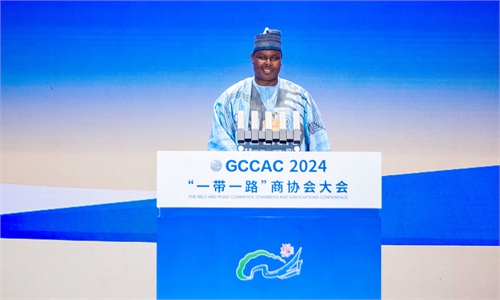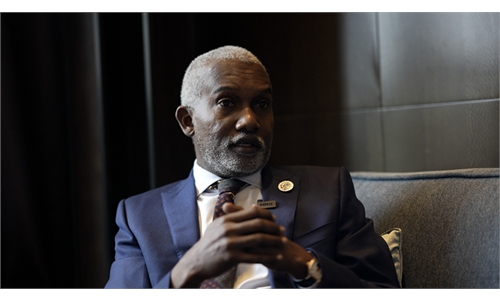Nigeria-China cooperation supports local economic diversification under BRI: Nigerian official

Babagana Wakil, chargé d'affaires of the Embassy of the Nigeria in China, attends the 2024 Belt and Road Commerce Chambers and Associations Conference (GCCAC) on December 5, 2024. Photo: Courtesy of GCCAC
The China-proposed Belt and Road Initiative (BRI) is an inspiring framework for collaboration in the interconnected world, embodying a shared vision for growth founded on mutual respect and cooperation. Nigeria is fully committed to working alongside its Chinese partners and the global BRI community to seize new opportunities and build a future where prosperity knows no borders, Babagana Wakil, chargé d'affaires of the Embassy of the Nigeria in China, told the Global Times on Friday.
Wakil made the remarks as he attended the 2024 Belt and Road Commerce Chambers and Associations Conference (GCCAC), which was held on Thursday in Fuzhou, East China's Fujian Province, in a bid to build an effective platform for connectivity and promote exchanges and cooperation in fields such as economy and trade, culture, science and technology between BRI partner countries, as well as the prosperity and development of the Maritime Silk Road.
Nigeria's partnership with the BRI aligns with its vision for sustainable development and economic diversification. As Africa's most populous country and largest economy, Nigeria plays an important role in bridging African and global markets. Since joining the BRI in 2018, Nigeria has embraced its opportunities, harnessing the initiative to develop critical infrastructure, promote trade, and drive innovation. The success of this partnership stands as a testament to the transformative potential of collaboration. Sustainability and inclusivity must remain central to the BRI as we deepen our partnership, he told the Global Times.
Our active engagement in the BRI has led to significant achievements across key sectors. In infrastructure, landmark projects such as the Lekki Deep Sea Port, Lagos-Ibadan Railway, and Abuja Metro Line have enhanced trade, connectivity, and industrialization, while the Zungeru Hydropower Plant has bolstered renewable energy capacity, according to Wakil.
Trade between Nigeria and China reached over $22 billion in 2023, reflecting a strong partnership that supports Nigeria's economic diversification efforts in agriculture, manufacturing, and information and communications technology (ICT). He noted that collaborations in ICT have positioned Nigeria as a tech hub in Africa, with advancements in 5G, e-commerce, and digital skills.
Nigeria is a major economy in Africa with rich resources, and China and Nigeria have conducted various mutually beneficial and win-win cooperation under the BRI, Song Wei, a professor from the School of International Relations and Diplomacy at Beijing Foreign Studies University, told the Global Times on Friday.
As advancing digital economy is a major developing trend worldwide, Song highlighted that the bilateral cooperation in the sector covers aspects from building digital infrastructure to talent training.
The cooperation between Nigeria and China is just a vivid representation of China's close cooperation with African countries under the BRI, as 2024 is a major year for enhancing bilateral cooperation, especially amid the successful conclusion of the 2024 Summit of the Forum on China-Africa Cooperation held in September.
Namibia and China are highly aligned in green transformation and there is a great potential for both sides to explore future cooperation in this field, Elia George Kaiyamo, the Namibian ambassador to China, told the Global Times in an exclusive interview.
Song stressed the importance of advancing the modernization of Africa through cooperation under the BRI, while expecting the two sides to further elevate cooperation in infrastructure through expanding diverse investment channels.
In addition, China and Africa are expected to step up industrial cooperation as advancing modernization needs the development of modern agriculture and industries, according to Song.
She noted that the two sides will continue deepening industrial cooperation while promoting more Chinese enterprises to expand businesses in Africa, while enhancing the vocational training to cultivate more high-quality professionals.
The purpose of high-quality joint construction of the Belt and Road is to provide the countries that are building the Belt and Road with the opportunity to enjoy unimpeded connectivity with the world, and to bring hope for development and revitalization to the global South, Chinese Foreign Ministry Spokesperson Lin Jian said on Friday. Lin said that China is willing to build the BRI into a "road of happiness" for the benefit of the world and a "dream factory" for the common modernization of all countries.
China has granted zero tariffs to Least Developed Countries (LDCs) with established diplomatic relations, including 33 African countries, which went effective starting on December 1.
Meanwhile, during the 7th China International Import Expo in October, China provided over 120 free booths to exhibitors from 37 LDCs while focusing on showcasing special agricultural products from Africa.


